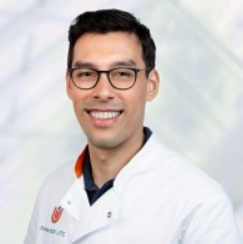Stichting Sportdokters.nl, where Kistemaker has volunteered for 7 years, provides medical supervision at sporting events, with an emphasis on cycling races. What began as a small initiative has grown into a professional organization involved in major events such as the Tour de France Femmes, triathlons and running races.
The founder of Sportdokters.nl, Guusje Vrehen, has known Kistemaker since he was 16 and she inspired him to make the switch to medicine. “The great thing is that I can combine my love for sports with my medical background,” he says.
Medical care during Tour
During the Tour de France Femmes, the team of Sportdokters.nl was responsible for the medical care of riders, team leaders, jury members and volunteers on Dutch territory. Because French medical teams have no authority in the Netherlands, the Sportdokters.nl foundation was called in. “With a team of 14 volunteers, including doctors and ambulance nurses, we were ready to take immediate action in case of falls and be available 24/7 for the riders,” Kistemaker explained. The team rode along with motorcycles, doctor's cars and ambulances. “Our work is mainly focused on quick action in the event of crashes,” he explains. “In the event of a fall, you have to assess immediately whether someone can continue or whether an ambulance is needed.”

We stood there in the middle of a meadow, in the grass, without the aids you normally have in a hospital"
The quick decisions required during cycling races make the job as a sports doctor special. Kistemaker recounts an incident during the Ronde van de Achterhoek, where a rider drove into a tree at high speed and became unconscious. “We were standing there in the middle of a meadow, in the grass, without the tools you normally have in a hospital. It was improvising and acting fast, but fortunately the rider came to and was taken to the hospital.”
International cooperation
Working with the French medical teams during the Tour de France Femmes was a learning experience for Kistemaker and his colleagues. “It felt like we were working on French territory for 4 days,” he says. “Everything was in French and the French colleagues were always trying to take charge. Their working methods are quite hierarchical, which differs from the more open Dutch approach where everyone can voice their opinions,” Kistemaker says. Despite the differences, he also saw opportunities to learn from each other. “There are definitely things we can adopt from their approach.”
Inventive
Working at sporting events differs greatly from Kistemaker's daily work at Amsterdam UMC. “In the hospital you have all the tools and a whole team to fall back on. At sporting events you are often in the middle of the street without all those luxuries. You have to switch quickly and be inventive with the resources you have,” he explains. Sometimes he has to convince riders or their team managers not to continue riding after a fall, even if they want to. “If we suspect someone has a concussion, we can take them out of the race. If they still want to continue against our advice, they have to sign a form.”
Medical care at sporting events
Attention to professional medical care at sporting events has grown in recent years, in part due to the efforts of organizations such as the Sportdokters.nl foundation. “There used to be little focus on medical care at events, but that's changing now,” says Kistemaker. “The rules are being tightened and the deployment of specialist teams is becoming increasingly important, especially in high-risk sports such as BMX and track cycling.”
Kistemaker is already looking forward to his next event, the Knokke triathlon. “It's hard work, but it's totally worth it,” he concludes. And for colleagues at Amsterdam UMC who are interested in volunteering at sporting events, Kistemaker has a clear message: “Anyone with experience in acute care and preferably in possession of an ALS or ATLS diploma is welcome to apply to the Sportdokters.nl foundation through the website. It is challenging work, but also incredibly fun and sociable.”
Translated from: Van wielrenner tot sportdokter: achter de schermen bij de Tour de France Femmes

